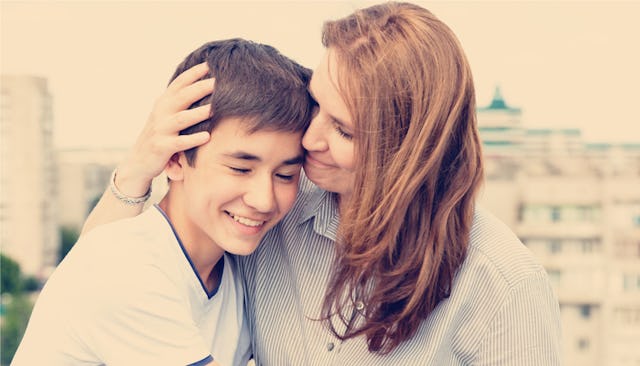This Is Why I (Sometimes) Talk To My Kids About My 'Adult Problems'

Recently, I was having a conflict with a family member. I was in a foul mood for several days, so I was being super mature by slamming things, biting people’s heads off when they asked me questions, and eating all the chocolate and not sharing. I mean, that’s all stuff I normally do, but it was worse than normal. My whole family was avoiding me, and I couldn’t blame them.
So, I decided to have a sit down with my oldest and just be honest.
Me: You’ve probably noticed I’ve been super grumpy lately.
Her: (slow head nod — probably for fear I’d start crying again or ban everyone from my sight)
Me: Well, I just wanted to tell you that I’m having a hard time with something, and it’s affecting me. I’m sorry I’m grumpy, but I just wanted you to know that it has nothing to do with you.
Since she’s my oldest, I went on to explain in minimal detail the issue I was having, and how I wish it didn’t affect how I was feeling and acting, but that it was. Then I reassured her it wasn’t about her, she didn’t do anything wrong, and it would get better. We hugged it out and moved on. And by sharing that little bit with her, I instantly felt better. She did too.
I think sometimes, we forget that these children are meant for us just as much as we are meant for them. I truly believe that. I look at my daughter and see forgiveness and kindness that I don’t have. I look at my middle child and see a love of life and laughter that I need to survive my day. And I look at my youngest and melt when he mispronounces words and still wants to snuggle. I need them just as much as they need me.
And that’s the beautiful part of being in a family. We all bring our strengths, and weaknesses, to the table and build each other up.
My kids are here to help me as much as I’m here to help them. So, why not rely on them for emotional support when I need it?
Now, before you start getting all worked up, hear me out. There is a difference, of course, between dumping adult problems on your kids and simply explaining to them that you are feeling sad, grumpy, frustrated. Kids don’t often need to know the nitty-gritty details like how you’re worried about paying your mortgage that month or if your marriage will survive the next year.
Trust me, I was a highly anxious child, and knowing my parents were struggling with money never helped me. But it’s okay to tell your kids that you’re having a bad day. By doing this, your child gets the opportunity to support you, lift you up, and (let’s be real here) hopefully try to be on their best behavior until the trial passes.
Who knows, maybe they’ll write a nice note, let you sleep in, or help out with dinner because they know you are hurting.
My children are some of the most loving people I know. Why wouldn’t I let them love me even more by letting them know I’m having a hard time?
It’s like having a friend who is walking around crusty and pissed off all the time. Of course you’re naturally going to feel hurt, thinking they are upset with you. But let’s say that you later find out they just lost their pet. You probably have a change of heart and want to help and support them. You’re happy to forgive them for their negative behavior and offer support for through their hard time.
Kids are capable of doing that too — if we let them. But there’s a right and a wrong way to it. Here are some ideas for talking to your kids about problems in a healthy way:
Don’t turn your child into your confidant. A child’s role should never be to keep secrets for adults. We’ve all had a child blurt something out in public that is horrifying. So when you decide to share struggles with your kids, make sure it’s kid-appropriate, and that it’s not too much information that would cause worry that is not age-appropriate.
Let them know that you are dealing with your problem. Remind your child that you know how to handle the issue so that they don’t worry. And if you don’t, be honest and let them know you’re trying to figure out how to fix a situation, and it’s not their job to fix it. Kids need to be reassured that they still have a safe and secure environment.
Tell them that you’re there for them when they have struggles too. I think sharing with kids that you are in a difficult spot will help them learn valuable lessons; one of which is that you are part of a family, and everyone in the family will have struggles at some point, and you are all there for each other. Remind them that everyone has problems, so that they will not internalize their own issues later on.
Emphasize that they did not cause the problem, and that you’re not angry with them. One of my biggest reasons in sharing when I’m upset with my kids is that I don’t ever want them thinking my frustration or sadness is about them when it’s not. That’s a big burden for little kids to bear, and I don’t want them carrying it.
My kids are empathetic, kind, and loving. They impress me every day with their compassion, and the love they show each other. By sharing a little bit (not too much) of my own struggles with them, it gives us all an opportunity to lean on each other in a way that we maybe wouldn’t otherwise.
After all, that’s what families are for, right?